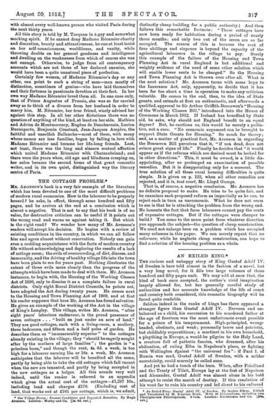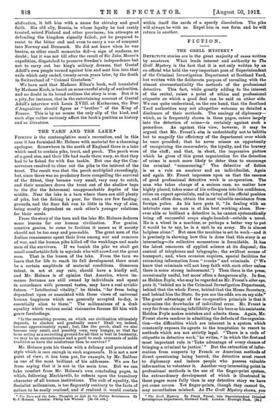AN EXILED KING.*
Tux curious and unhappy story of King Gustaf Adolf IV. of Sweden is here told almost in the fashion of a novel, but a very long novel, for it fills two large volumes of three hundred and fifty pages each. We may add at once that, the kind of book once accepted, the author's vivid imagination largely allowed for, but her generally careful study of authorities and her accurate knowledge of the life of court and country both considered, this romantic biography will be found quite readable.
Seldom indeed in the ranks of kings has there appeared a stranger figure than Gustaf Adolf IV. Nervous and un- balanced as a child, his succession to his murdered father at the age of fourteen was the most unfortunate event possible for a prince of his temperament. High-principled, wrong- headed, obstinate, and weak ; personally brave and patriotic, but childishly superstitious ; a martinet in his own household, a plaything in Europe, a would-be pilgrim to the Holy Land, a creature full of pathetic fancies, who dreamed, after his abdication, of ruling Elba in Napoleon's place, or fighting with Wellington itgainst " the universal foe " : if Paul I. of Russia was mad, Gustaf Adolf of Sweden, with a milder eccentricity, could scarcely be called sane.
And yet he had a touch of the hero. When, after Friedland and the, Treaty of Tilsit, Europe lay at the feet of Napoleon and Alexander, Gustaf Adolf was almost alone in his bold attempt to resist the march of destiny. If this resolution of his went far to ruin his country and led direct to his enforced
• An Exiled King: Gustaf Adolf IV. of Sweden. By Sophie Elkan. Edited and Translated by M. Eugenie Koch, With 26 Illustrations, including two Photogravure Frontispieces. 2 vols. London: Hutchinson and Co. Cali,. net.]
abdication, it left him with a name for chivalry and good faith. His old ally, Russia, in whose loyalty he had rashly trusted, seized Finland and other provinces; his attempts at defending the kingdom signally failed ; yet he prepared to resist to the bitter end and even to carry a war of conquest into Norway and Denmark. He did not know when he was beaten, as other small monarchs did—a sign of madness, no doubt ; but it was not till after the recall of Sir John Moore's expedition, dispatched to preserve Sweden's independence but not to carry out her king's military dreams, that Gustaf Adolf's own people turned against him and sent him into that exile which only ended, twenty-seven years later, by the death in Switzerland of " Colonel Gustafson."
We have said that Madame Elkan's book, well translated by Madame Koch, is based on some careful study of authorities, and no doubt in its broad outlines the story is true. But it is a pity, for instance, that in the entertaining account of Gustaf Adolf's interview with Louis XVIII. at Karlscrona, the Due d'Angouleme should figure as " brother" of the King of France. This is by no means the only slip of the kind, and such slips rather seriously affect the book's position as history and as literature.



































 Previous page
Previous page